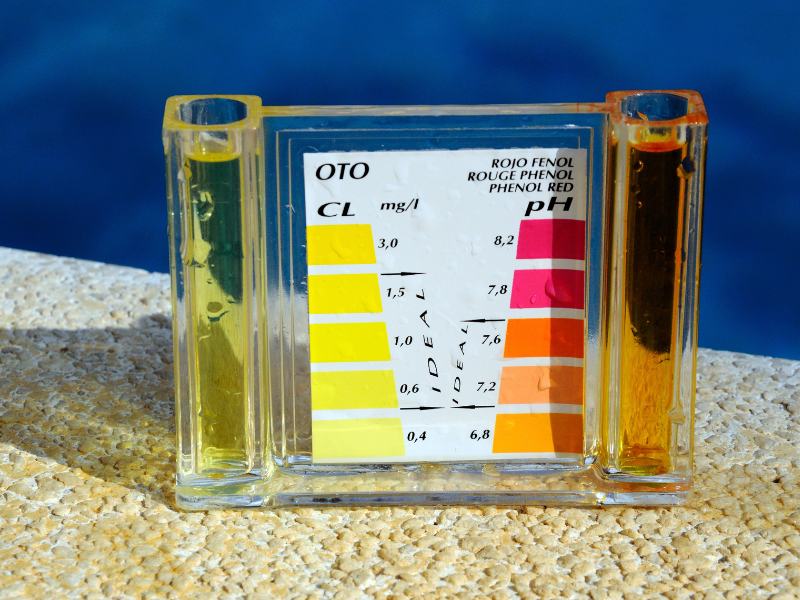What do cake, wine, and the chemicals in your Winnipeg pool have in common? They’re all best enjoyed in moderation.
Your pool is a finely-tuned blend of competing chemicals that clean your water, prevent algae from growing, and protect your pool equipment. Keeping these chemicals in balance can be tricky. Too much calcium and you’ll scald your liner, too little chlorine and your pool will become a petri dish faster than you can say ‘ewwww’.
Don’t waste time puzzling through complicated manufacturer instructions or asking Google, read our guide below to get all the information you need, directly from experienced pool experts.
Your pool water chemistry
Before we dive into the details, here’s a quick summary of what’s going on in your pool. There are five chemical levels that you need to be mindful of when maintaining the quality of your pool water:
- Cyanuric Acid
- Calcium hardness
- Total alkalinity
- Alkalinity/acidity
- Free chlorine
Optional chemicals that can be monitored for enhanced cleaning include:
- pH levels
- Combined chlorine
- Salt
How to balance your pool in 5 easy steps
1.Know your Cyanuric Acid (CYA) levels
Cyanuric acid protects chlorine from direct sunlight (which burns it off) and regulates your levels of free chlorine. Check your CYA levels and get familiar with the recommended dosages:
- For indoor pools – 0 to 20
- For outdoor pools – 30 to 50
- For salt pools – 70 to 80
You can increase your CYA levels by adding a CYA conditioner or stabilizer. To reduce it, you’ll have to replace the water in the pool.
2. Check your FC and CC regularly
Free Chlorine (FC) is the stuff that keeps your pool sanitized and algae-free. If levels drop too low, things will start to grow and eventually turn your pristine pool into a murky science experiment. FC should be added on a regular basis, depending on how often you use your pool, your CYA levels, and how much direct sunlight your pool gets. You can easily boost your FC levels by adding liquid chlorine.
Combined chlorine is created during the disinfection process, generating that tell-tale chlorine odor. Your CC should be maintained at zero, or close to it. If it rises above 0.5, that’s a sign something’s amiss and you should double-check your FC levels.
3. Find the perfect pH
We recommend testing your pool’s pH daily to keep it within the ideal range of 7.2 to 7.6 pH. Don’t be tempted to skip this task – if your pool is too alkaline, it’ll leave you with cloudy water and your chlorine will be much less effective at sanitizing. If it’s too acidic, the water will irritate your eyes and skin. If it’s really acidic, it’ll start to corrode your pool equipment. To lower the pH, add dry acid or muriatic acid. If you want to raise it, use soda ash or borax.
4. Regulate calcium hardness
If you’re seeing crusty, white patches all over your pool liner you probably have a calcium issue. High levels of this mineral in your pool leads to calcium scaling, and that can really mess up your liner.
Ideally, you want to keep your calcium in the range of 200 to 400 ppm, and even lower if you have a vinyl liner. To lower your calcium levels, you have to replace your water. To increase them, you can add calcium chloride or calcium hydroxide.
5. Get salty
If you have a salt water pool, you probably have a salt water chlorine generator (SWG). These handy devices turn salt into chlorine to help sanitize the water. While this keeps things clean, it also eats up your salt so pool owners should supplement when levels get too low.
With an SWG, your pool’s salt levels should be stable at around 3,000. If you don’t have a SWG but want the ‘feel’ of a saltwater pool, add your own – we recommend maintaining levels of 2,000.
Ask the pool cleaning experts!
If you’re still wondering how to optimize your water quality, download our Water Testing Guide to find out more about keeping your pool in top condition.
And if you’ve any further questions, just ask! The experts at UV Pools are proud of being pool nerds – there’s nothing we don’t know about pool cleaning, maintenance, and chemistry so if you get confused, just give us a call. We’re not just nerdy, we’re pretty friendly too and we love solving pool problems. Summer’s coming, make sure your pool is ready for swimming season, get in touch today!

